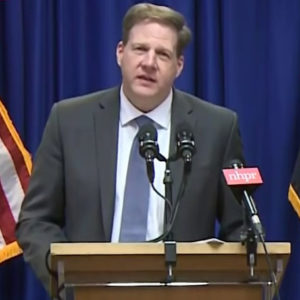Gov. Chris Sununu announced Thursday he’s ordering the state’s public schools to reopen at least two days a week beginning March 8. It’s a decision likely to thrill thousands of working parents while enraging the state’s teachers unions and their Democratic allies.
”In the next few days, I will be signing an Executive Order requiring that, starting March 8, all K-12 schools must provide the option of in-person learning at least 2 days a week,” Sununu said. “The data is clear. Even without complete teacher vaccination, schools can reopen safely.”
It’s the culmination of a political battle that’s been waging for weeks between Sununu and the NEA-NH, as well as between parents and local schools across the state. Sununu has repeatedly pointed to data indicating classroom transmission of COVID 19 is extremely rare. NEA-NH President Megan Tuttle has insisted classrooms must be closed until all teachers are vaccinated, going so far as to call them “first responders.”
Tuttle has declined repeated requests to provide data showing healthy teachers are at increased risk of infection by returning to classrooms. Multiple studies indicate they are not.
Sununu signed the original emergency order closing the Granite State’s schools on March 16, 2020. He instructed them to develop remote learning which, he said, would remain in place through at least April 3 of that year. “We are taking unprecedented action today as a state to help manage this evolving public health situation. We are doing everything we can to ensure that kids still receive the education that they deserve across New Hampshire,” Sununu said at the time.
On Thursday, Sununu noted nearly a year had passed since that order had been issued and said it’s time for schools to get back in the classroom instruction business.
Asked where he was getting the legal authority to make such a declaration, Sununu replied, “Prior to COVID, schools had to stay open. We’re just going back to, effectively, that model.”
Sununu added schools needing to close temporally due to an outbreak would have that flexibility. “But anything beyond that would require the express written consent of the [Education] Commissioner and our office.”
And if a school or its teachers simply refuse to follow the governor’s order and reopen classrooms at all?
“We will work in partnership with all schools to ensure that teachers and students have the right tools and resources to reopen, and the governor has full confidence that the few schools who have so far not reopened to in-person learning will do so,” Sununu’s spokesperson Ben Vihstadt told NHJournal.
The teachers union quickly struck back.
Tuttle released a statement calling Sununu “late to the game,” and suggesting his decision was political retaliation for a failed education reform proposal in the legislature earlier that day.
“You’re late to the game, Governor,” said Megan Tuttle, NEA-NH President. “Educators and districts have already worked together to reopen more than 80% of NH schools for at least 2-3 days a week of in-person instruction – some for even more days each week.”
As for the politics, the union’s press release begins: “On the same day his bill to expand vouchers in New Hampshire to levels not seen in any other state failed to clear the House Education Committee on a vote of 20-0, Governor Sununu announced a new Emergency Order forcing any New Hampshire school district not currently offering at least 2 days of in-person instruction to begin doing so by March 8.”
Tuttle also denied the union’s position has been to insist on vaccinations before reopening. “We have never said that educators need to be vaccinated before schools can re-open. We said we believe educators should be vaccinated before the ski patrol. But once again, during today’s press conference Governor Sununu repeated this misinformation.”
However, as NHJournal reported at the time, Tuttle told NHPR on January 22: “Educators should be vaccinated before the schools can reopen safely.” (You can hear Tuttle’s comment at the 2:30 mark.)
Sununu says it shouldn’t be difficult for the remaining schools to return to at least part-time classroom instruction.
“Whether it’s the CDC, or the state [Department of Health and Human Services], everyone has said that there’s no reason that these schools can not open, even without vaccinations. And that model has been born out time and time again,” Sununu said.
As for the schools that say they can’t make reopening work, Sununu had this advice:
“If you have any questions about how to do it, chances are the district right next to you is doing it already.”



